FARMINGTON, ME (February 12, 2020)—Nine University of Maine at Farmington students, accompanied by two faculty instructors, recently returned from a travel course to Tanzania in East Africa, with a new perspective on making the world a better place.
The UMF winter course, which has been offered three times on a biannual basis, focuses on Sustainable Tourism and Environmental Activism.
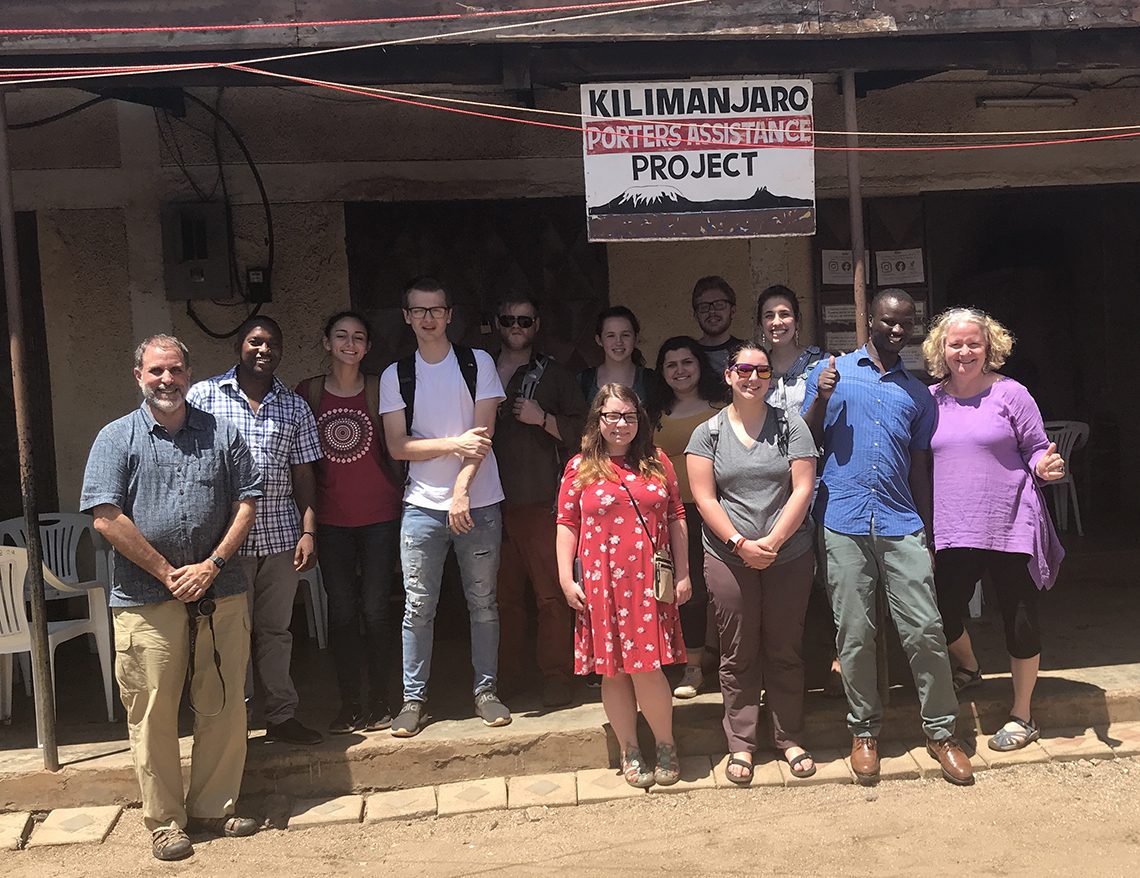 As a significant part of their coursework, students visited the Kilimanjaro Porters Assistance Project, a non-profit initiative to raise public awareness of the fair and ethical treatment of porters on Kilimanjaro. (Left to right) Mark Pires (UMF co-instructor), Kelvin Salla (KPAP assistant director), UMF students Erin Gonzalez, Nik Peterson, Derek Taber, Emily Cetin, Adriana Burnham, Nolan Crandall, Alexis Paradis. (Front row) Mariah Langton, Riley Sampson, David Mtuy (Mount Kilimanjaro porter) and Linda Beck (UMF professor and trip leader.)
As a significant part of their coursework, students visited the Kilimanjaro Porters Assistance Project, a non-profit initiative to raise public awareness of the fair and ethical treatment of porters on Kilimanjaro. (Left to right) Mark Pires (UMF co-instructor), Kelvin Salla (KPAP assistant director), UMF students Erin Gonzalez, Nik Peterson, Derek Taber, Emily Cetin, Adriana Burnham, Nolan Crandall, Alexis Paradis. (Front row) Mariah Langton, Riley Sampson, David Mtuy (Mount Kilimanjaro porter) and Linda Beck (UMF professor and trip leader.)
According to the United Nations Educational, Scientific and Cultural Organization (UNESCO), sustainable tourism is a growing travel industry defined as, “tourism that respects both local people and the traveler, cultural heritage and the environment.”
The course ran from December 27 to January 9 this year and covered everything from a survival lesson in Swahili; to a tour of local villages to better understand local livelihoods and customs; to meetings with local tourism operators and environmental activists about community-based conservation, wildlife corridors and land rights for indigenous communities.
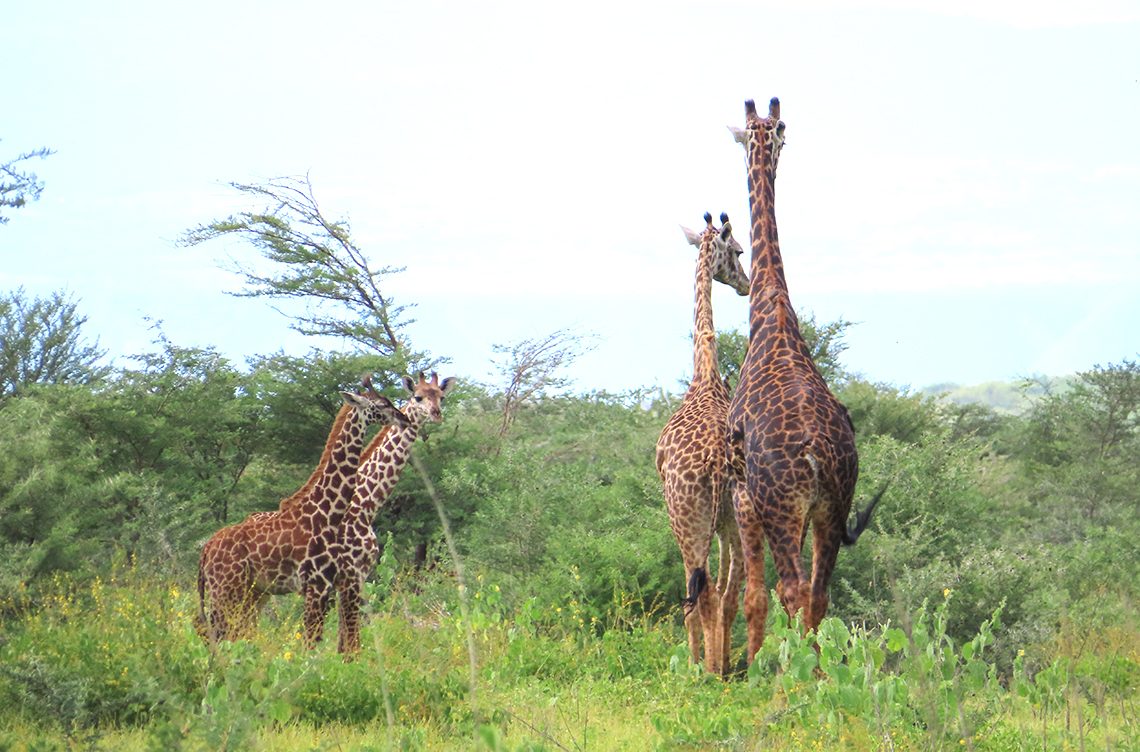 Giraffes were one of the many native African wildlife students enjoyed while on safari.
Giraffes were one of the many native African wildlife students enjoyed while on safari.
Tanzania is famous for tourism, with the country’s network of national parks, reserves and conservation areas spanning one quarter of the country. While there, UMF students had the chance to experience eating local foods, touring a local school, picking coffee at a fair trade coffee cooperative and planting trees to combat deforestation on the slopes of Kilimanjaro.
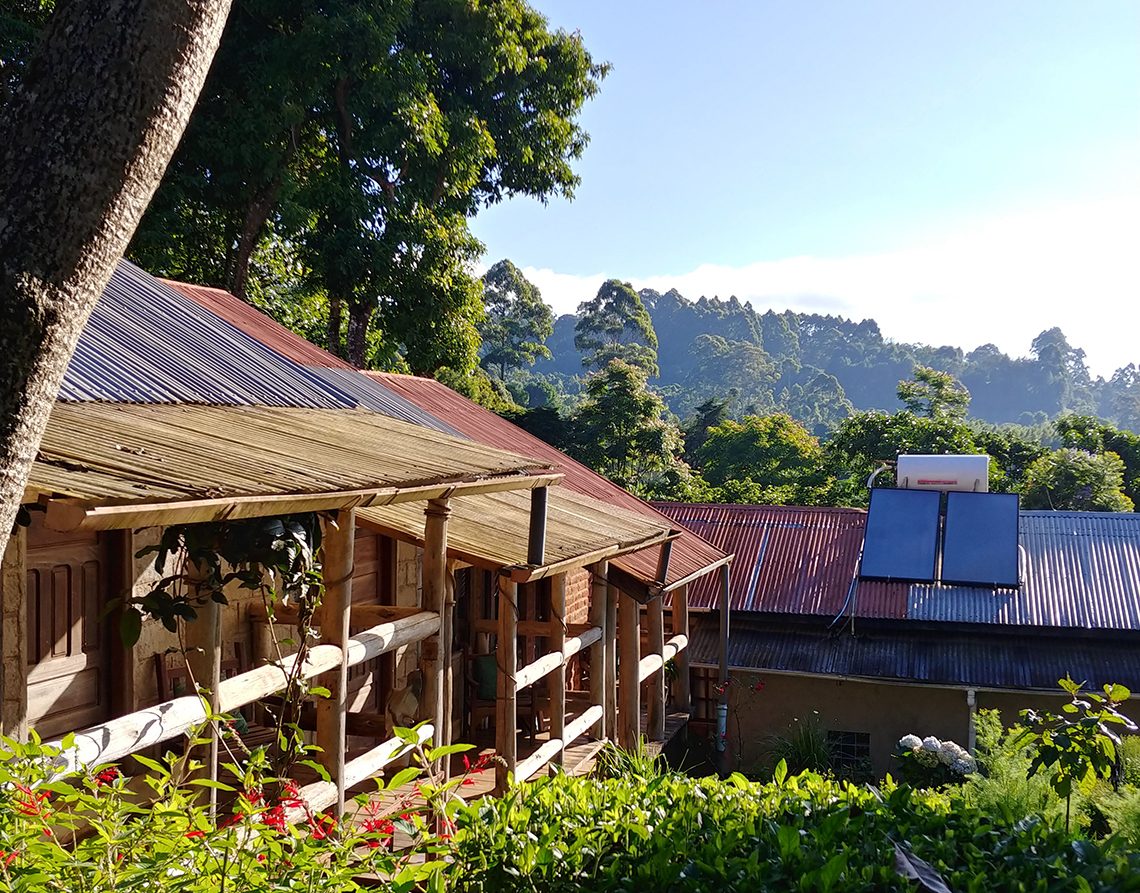 Sustainable lodging in Mbahe, Tanzania, where UMF travel course participants stayed.
Sustainable lodging in Mbahe, Tanzania, where UMF travel course participants stayed.
Nik Peterson, a sophomore from Lewiston majoring in psychology, looked forward to seeing sustainable tourism in action and adding international experience to his resume for medical school.
“You think about making a difference as a simple thing,” said Peterson. “But a field experience like this, where you get to see the significant impact your decisions can have on the lives of real people, not only changes their lives, it changes you in the process.”
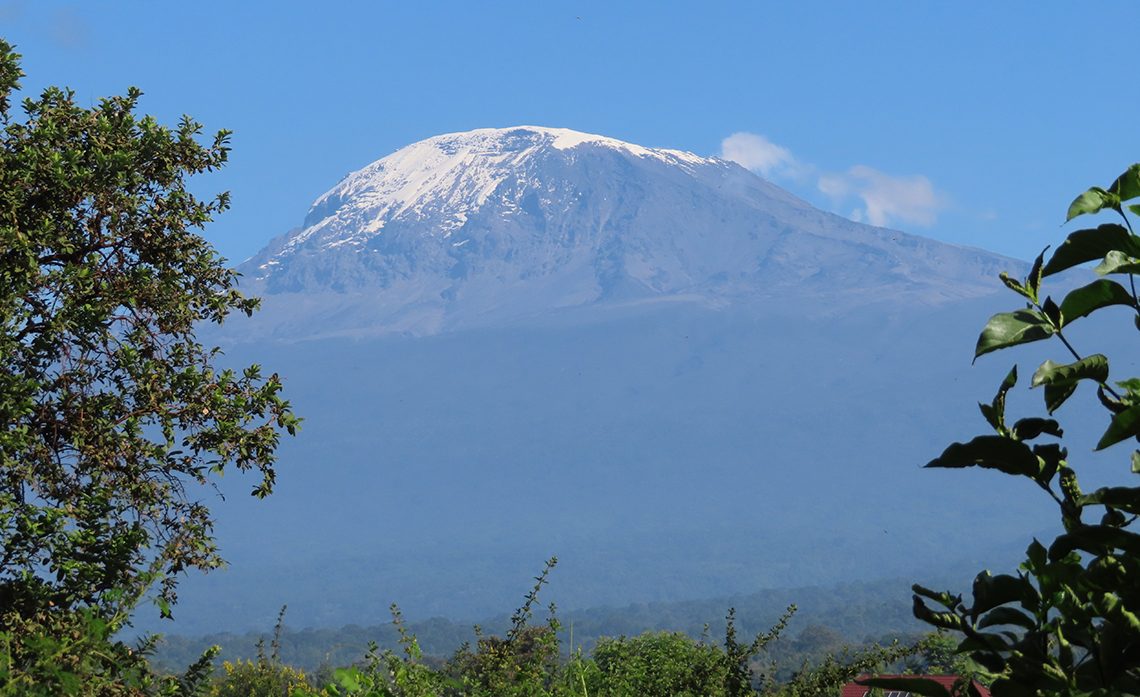 Mount Kilimanjaro, the highlight of the UMF Sustainable Tourism course, is the highest point in Africa, at 19,341 feet.
Mount Kilimanjaro, the highlight of the UMF Sustainable Tourism course, is the highest point in Africa, at 19,341 feet.
A highlight of the travel course is a day hike in Kilimanjaro National Park. Mount Kilimanjaro is the highest point in Africa, at 19,341 feet, and the highest single free-standing mountain in the world. A huge tourist attraction, the mountain sees tens of thousands of tourists annually and generates thousands of jobs for local porters.
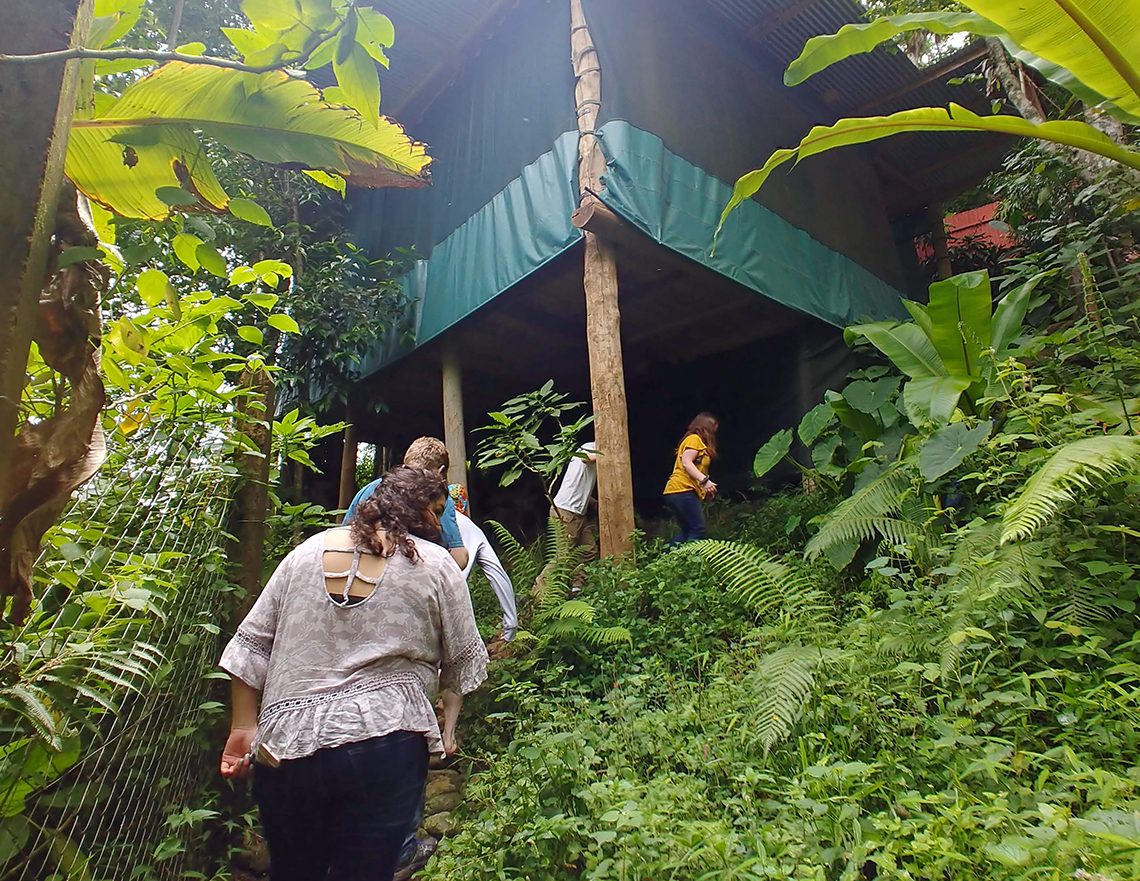 UMF students on winter travel course to Tanzania, hike the side of Mount Kilimanjaro.
UMF students on winter travel course to Tanzania, hike the side of Mount Kilimanjaro.
Unfortunately, local residents working as porters are poorly educated and often don’t speak English. They can easily be victims of poor working conditions and inadequate wages. As a significant part of their coursework, students visited the Kilimanjaro Porters Assistance Project, a non-profit initiative to raise public awareness of the fair and ethical treatment of porters on Kilimanjaro.
“KPAP is a key partner with UMF and a real-life example for our students of sustainable tourism in action,” said Linda Beck, associate dean of UMF Experiential and Global Education, professor of political science and trip leader.
The organization offers climbing gear free of charge for loan to porters and mountain crew who cannot afford the proper equipment. It also educates the climbers with fundamental information concerning proper porter treatment and advocates climbers to make an informed decision in choosing a socially responsible climbing company.
“One of the major issues the porters face is exposure due to insufficient equipment for the cold climbs to the summit,” said Beck. “Each time I have offered the course in the past, we take hiking boots and winter gear donated by UMF students, staff and Farmington community members. It’s a wonderful experience for our students to be a part of this new perception of tourism, where travel not only enriches the traveler’s life but also positively impacts the lives of the local people.”
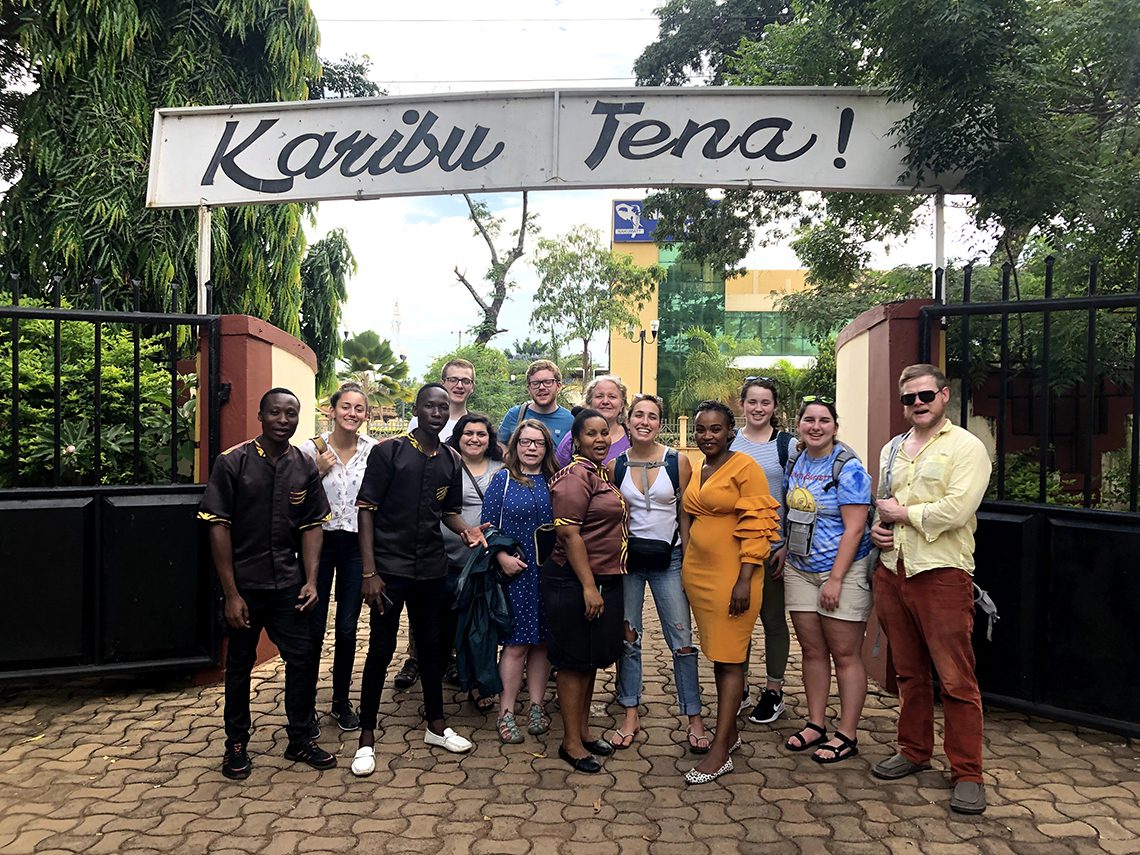
UMF students and faculty leaders with local staff outside Kilimanjaro Café in Moshi in Northern Tanzania. Sign reads “Come Back Again.”
UMF student hometowns: Adriana Burnham, Farmington; Emily Cetin, Barre, Ver.; Nolan Crandall, Bar Harbor; Erin Gonzalez, North Andover, Mass.; Mariah Langton, Madison; Alexis Paradis, Lewiston; Nik Peterson, Lewiston; Riley Sampson, Chesterville; Derek Taber, West Farmington.
# # #
Media Contact: said Linda Beck, associate dean of UMF Experiential and Global Education, professor of political science, linda.beck@maine.edu or 207-778-7292
EDITOR’S NOTE:
Link to image on WordPress: https://www.umf.maine.edu/wp-content/uploads/sites/1/2020/02/RP190-040E.jpg
Photo Caption: As a significant part of their coursework, students visited the Kilimanjaro Porters Assistance Project, a non-profit initiative to raise public awareness of the fair and ethical treatment of porters on Kilimanjaro. (Left to right) Mark Pires (UMF co-instructor), Kelvin Salla (KPAP assistant director), UMF students Erin Gonzalez, Nik Peterson, Derek Taber, Emily Cetin, Adriana Burnham, Nolan Crandall, Alexis Paradis. (Front row) Mariah Langton, Riley Sampson, David Mtuy (Mount Kilimanjaro porter) and Linda Beck (UMF professor and trip leader.)
Link to image on WordPress: https://www.umf.maine.edu/wp-content/uploads/sites/1/2020/02/RP190-040F.jpg
Photo Caption: Giraffes were one of the many native African wildlife students enjoyed while on safari.
Link to image on WordPress: https://www.umf.maine.edu/wp-content/uploads/sites/1/2020/02/RP190-040D.jpg
Photo Caption: Sustainable lodging in Mbahe, Tanzania, where UMF travel course participants stayed.
Link to image on WordPress: https://www.umf.maine.edu/wp-content/uploads/sites/1/2020/02/RP190-040A.jpeg
Photo Caption: Mount Kilimanjaro, the highlight of the UMF Sustainable Tourism course, is the highest point in Africa, at 19,341 feet.
Link to image on WordPress: https://www.umf.maine.edu/wp-content/uploads/sites/1/2020/02/RP190-040B.jpg
Photo Caption: UMF students on winter travel course to Tanzania, hike the side of Mount Kilimanjaro.
Link to image on WordPress: https://www.umf.maine.edu/wp-content/uploads/sites/1/2020/02/RP190-040H.jpg
Photo Caption: UMF students and faculty leaders with local staff outside Kilimanjaro Café in Moshi in Northern Tanzania. Sign reads “Come Back Again.”
Photo Credit: UMF Images
April Mulherin
UMF Associate Director for Media Relations
office: 207-778-7081
cell: 207-491-0064
april.mulherin@maine.edu

